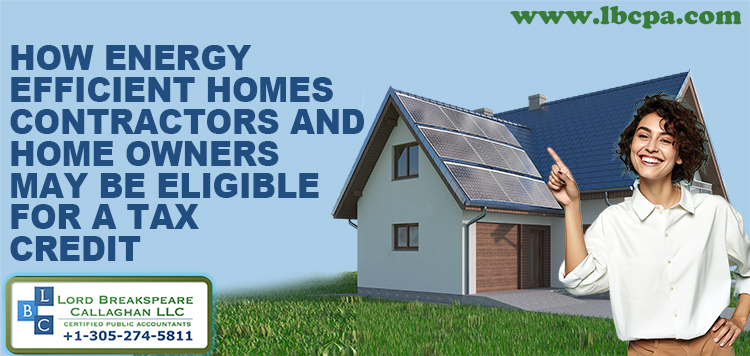LBCPA News 
Click here to go back
Builders of Energy Efficient Homes may Qualify for a Valuable Tax Credit

Eligible contractors who build new energy efficient homes or substantially reconstruct existing homes into qualified energy efficient homes may be eligible for a tax credit up to $5,000 per home. The exact amount of the credit depends on eligibility requirements such as the type of home, the home's energy efficiency and the date when someone buys or leases the home.
Contractor eligibility
To claim the credit, contractors have to:
- Construct or substantially reconstruct and rehabilitate a qualified home.
- Own the home and have a basis in it during construction.
- Sell or rent it to a person for use as a residence.
Home requirements
For a home to qualify, it must be:
- A single family home, including manufactured or multifamily homes, as defined under certain Energy Star program requirements.
- Located in the United States.
- Purchased or rented for use as a residence.
- Certified to meet applicable energy saving requirements based on home type before the home is sold or leased to someone for use as a home.
Energy efficiency requirements and credit amounts: 2023 and after
For homes acquired through 2032, the credit amount ranges from $500 to $5,000, depending on the certification achieved and standards met, which include:
- Energy Star program requirements.
- Zero Energy Ready Home program requirements.
- Prevailing wage requirements.
Energy efficiency requirements and credit amounts: Before 2023
For homes acquired before 2023, the credit amount is $1,000 or $2,000 depending on the standard met, which include:
- 50% standard for single family, multifamily and manufactured homes: The home must have an annual level of heating and cooling energy consumption that is at least 50% less energy than a comparable home. It must also get at least 1/5 of its energy savings from building envelope components.
- 30% standard for manufactured homes: The manufactured home must have an annual level of heating and cooling energy consumption that is at least 30% less energy than a comparable home. It must also get at least 1/3 of its energy savings from building envelop components.
For both standards, the home must be certified to meet applicable energy savings standards, including the Energy Star program requirements. Manufactured homes must also meet Federal Manufactured Home Construction and Safety Standards.
How to properly claim the credit
Eligible contractors must meet all requirements before claiming the credit. Eligible contractors should review the Instructions for Form 8908, Energy Efficient Home Credit, for full details about these requirements. They must also complete Form 8908, Energy Efficient Home Credit, and submit it with their tax return to claim the credit.
If you have any questions regarding Essential Business Accounting, Domestic Taxation, International Taxation, IRS Representation, U.S. Tax Implications of Real Estate Transactions or Financial Statements, please give us a call at +1-305-274-5811
Source : IRS






